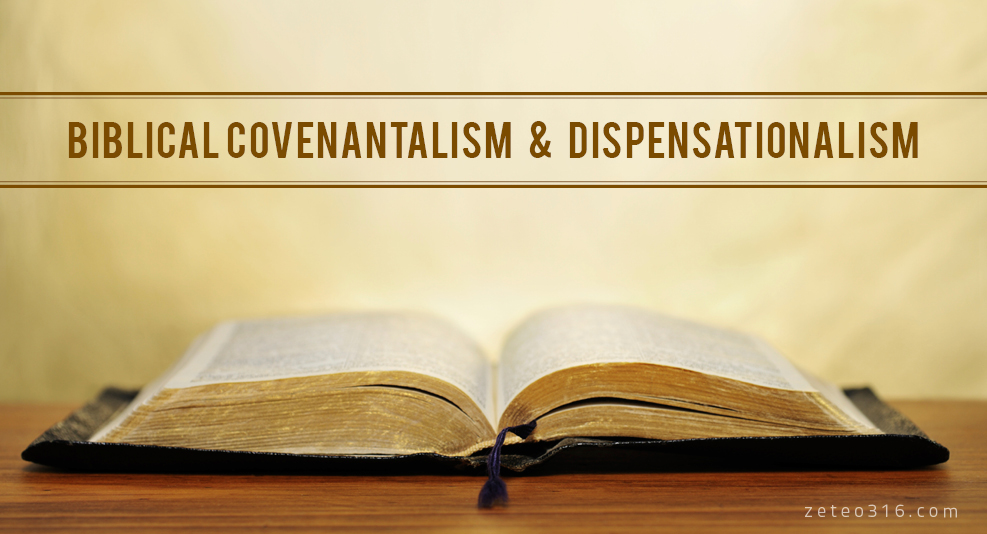
What are Biblical Covenantalism and Dispensationalism? Is dispensationalism a heresy? Can it be improved? What about Covenant Theology?
Back around 2004-2005, I decided it was high time I got myself a book on Systematic Theology. I was a relatively new Christian and wanted to learn more about theology. So I asked around for advice. I’ll never forget one reply I received. The fellow advised me that even if I didn’t purchase his book on Systematic Theology, I should avoid anything smacking of dispensationalism at all costs. He seemed to think it a heretical system. It was the first time I’d come across such hostility by a Christian for another theological system.
At that point I had a vague idea as to what dispensationalism taught, and agreed with what I understood. Dispensationalists taught premillennialism and a glorious future for Israel. That was clear from the Bible as far as I was concerned. The only tenet I was skeptical of was the pretribulational rapture view (I now hold that view).
If anything, the fellow’s advice made me want to find out more about dispensationalism and why he disliked it so much. While I initially suspected his contempt was driven by dispensationalism’s pretribulational rapture view (as is often the case); I began to see that the culprit was Israel. My adviser held to Replacement Theology – in his view all of Israel’s prophetic promises are fulfilled spiritually in the church. He believed that the expression “One People of God” ruled out any prophetic relevancy for the nation Israel. That was the real issue he had with dispensationalism.
Of course I now know that there are areas where dispensationalists disagree among themselves. The primary one, perhaps, would be the relationship between the church and the New Covenant. Does the church participate in the New Covenant?
During my research I came across Dr. Reluctant’s website. Most of the time, Dr. Reluctant is actually Dr. Paul Martin Henebury. Dr. Henebury is a dispensationalist who doesn’t like the term dispensationalism. One reason is because dispensationalism isn’t so much about dispensations as it is about the covenants. For example, there is debate as to how many dispensations there are.
Dr. Henebury has attended both Dispensational and Covenant Theology Institutions. Hence he’s well placed to offer constructive criticism of both systems. While he’s critical about aspects of dispensationalism, it’s not in the same way in which the fellow above was. Dr. Reluctant is a dispensationalist at heart – or more accurately, he is a Biblical Covenantalist. What lies at the heart of dispensationalism is the understanding that God means what He says.
The Biblical Covenantalism message is outlined in the links below. I wanted to provide them here because Paul Henebury’s thoughts are insightful and biblical. I’m concerned that the message isn’t getting out into the market place as well as it should. One is free to disagree with Dr. Reluctant, but one had better have a good biblical reason for it. He is thorough and honest in presenting the original intention of the texts.
Dispensationalism and Biblical Covenantalism – What’s in a name?
Excerpt:
I am not a Reluctant Dispensationalist either because I differ with my teachers, Mal Couch, Thomas Ice, Arnold Fruchtenbaum, Steve Ger, Tom McCall, and Robert Lightner. I learned a great deal from these men and esteem them all. But truly I wish we could all go back to the time of Erich Sauer and Alva McClain and follow their lead. They had little to say about “dispensations” in their overall schemes…keep reading
Dr. Reluctant’s Materials on Biblical Covenantalism (articles and videos)
I have been asked to put my stuff on Biblical Covenantalism in one place. These are the main posts which, I think, define and expound the concept and indicate where I am going with it. I hope placing them together helps out…keep reading
Note the section titled The “Book” – CHRIST AT THE CENTER: The Fulcrum of Biblical Covenantalism. In the introduction to Chapter 1a he writes:
There are all sorts of places one can launch out from when writing about the grand scheme of things in the Bible. Certain passages are just packed with theology! This has been seen and utilized by many writers down through the ages. From John Calvin to John Stott men have built solid arguments from expounding a few verses and establishing connections with the Biblical worldview. For all his faults Karl Barth is often a master at this. Theology as exegesis as meditation!
While I cannot hold a candle to such men I would like to follow suit. I’m going to do a series of posts showing how the perspective I call “Biblical Covenantalism” is radically Christocentric. This is in contrast with most Dispensationalism which, although certainly not obscuring Christ, nonetheless does not place Him at the center of their systems (I believe this is another handicap of defining oneself by “dispensations”).
Dr. Henebury’s Telos Ministries has a series of 28 audio studies on Biblical Covenantalism. Throughout this series he contrasts BC with dispensationalism and greatly expands on the latter. He also critiques the Covenant Theology system arguing cogently that God does, indeed, mean what He says. You can download each audio lesson. Highly recommended listening!
Listen to the Biblical Covenantalism Series HERE
Telos Theological Ministries has a YouTube page HERE
